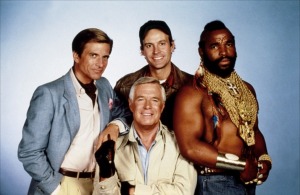 I’ve read a lot of business books on team-building, delegation, and leadership. But some of the best lessons on teamwork are the ones I learned at my grandparent’s house on Saturday afternoons when I was growing up. And I’m not talking about the wonderful things I learned by helping my grandma set the table or by playing cards with my grandpa (although they were pretty awesome).
I’ve read a lot of business books on team-building, delegation, and leadership. But some of the best lessons on teamwork are the ones I learned at my grandparent’s house on Saturday afternoons when I was growing up. And I’m not talking about the wonderful things I learned by helping my grandma set the table or by playing cards with my grandpa (although they were pretty awesome).
I’m talking about the A-Team.
Every Saturday afternoon my cousins and I gathered around to watch the reruns of Hannibal and his crew while they protected some poor soul from the villain of the week and then jetted off just before the MPs got there.
MBAs Could Learn a Lot from B.A.
I didn’t realize it at the time, but I was learning three important business lessons:
1. Do what you are good at.
Everyone on the team had a role. Hannibal did the planning and wore the disguises, Murdock could pilot any plane or helicopter, Face could talk to anyone (especially if she was pretty and had feathered hair – gotta love the 80’s), and B.A. Baracus could make an armored vehicle out of anything you gave him and then drive it like a pro. They each had their niche and they excelled at it. They didn’t try to be something they weren’t. Can you imagine Murdock trying to schmooze the ladies? C’mon, he was crazy!
2. Surround yourself by people who have different areas of expertise and let them do their thing.
Not only did each team member have their specialty, but they let the others pursue their activities without interference. They knew that their different skill sets would complement each other and lead to success. They didn’t micromanage each other and get in the way. For example, even though he was the de facto leader, Hannibal didn’t tell B.A. how to turn the school bus into a tank, he just said, “How can I help? Should I weld or find you some more sheet metal for the sides?”
3. Set clear project goals.
They had the team and they had the talent. But they also had a clear goal every week. Hannibal’s tagline, “I love it when a plan comes together…” only made sense because there was A) a plan and B) there was a clear understanding of what it was meant to accomplish (i.e., when it had actually come together). Whether they were protecting a farm from poaching ranchers or rescuing the damsel from the evil real estate developers, there were clearly delineated goals. That way, everyone knew how to best leverage their skills to move the team forward.
These lessons still resonate with me today. I’m always looking for what I can bring to the table and trying to identify the strengths of those around me. Remember these lessons the next time you are working with a team, and even more importantly, when you are leading a team. A big piece of the A-Team’s success came from each member leveraging their unique talents to make the sum of the parts greater than the whole. And really, isn’t that what teamwork is all about?
